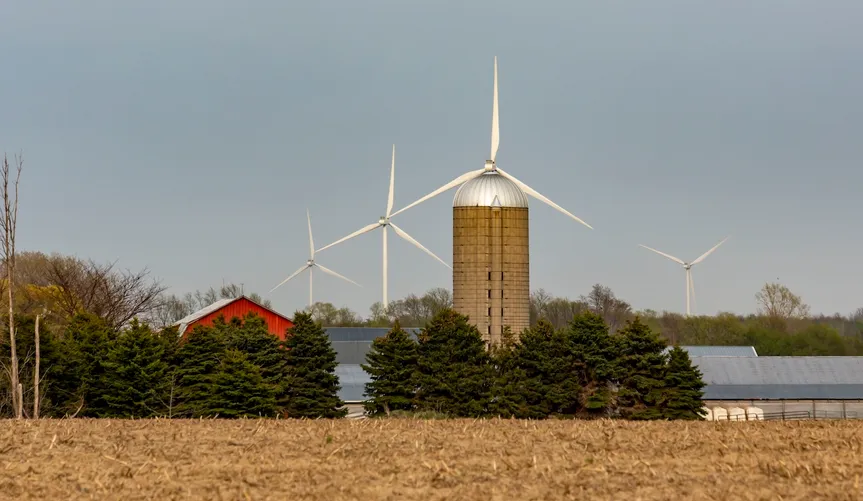
Hundreds of business people, policy analysts, and conservative advocates filled a downtown Cleveland conference hall last week for the National Conservative Energy Summit. One major theme: the need for both the federal and local governments to remove increasingly high hurdles to building renewable energy.
“Conservatives can and should lead on energy,” said John Szoka, CEO of the Conservative Energy Network, in his opening remarks.
The group, which cohosted the program with the Ohio Conservative Energy Forum, has a mission “to champion secure, reliable, affordable, clean American energy.” Its goal of achieving American energy independence includes support for a range of technologies, including solar, wind, battery storage, hydrogen, biomass, and small modular nuclear reactors.
The Trump administration has taken a more single-minded approach to energy.
Since January, it has promoted more fossil-fuel use and stalled the retirement of aging power plants. At the same time, it has rescinded grants and loans for clean energy projects; eliminated tax credits for wind, solar, EVs, and home-energy upgrades; and even halted construction on some offshore wind projects.
“While it’s easy to view this as a roadblock, … it’s a signal that we have more work to do,” Szoka said. He encouraged attendees to use what they learned during the conference in their grassroots efforts to build support for clean energy, especially when faced with extremism and misinformation. “If we don’t explain what’s going on clearly, we risk losing the argument before it even starts.”
As President Donald Trump attacks clean energy at the federal level, some states like Colorado and Maine are pushing to speed up deployment. But in general, state and local laws that restrict renewable energy development are gaining steam nationwide. A June report by the Sabin Center for Climate Change Law at Columbia University notes 16 states with laws limiting solar or wind, with over 450 counties and municipalities across more than 40 states imposing other restrictions.
Speaking at the conference, Jenifer French, chair of Ohio’s Power Siting Board and its Public Utilities Commission, noted that approximately 30 counties in the state ban solar or wind energy in all or parts of their territories, an authority granted to them by a 2021 law known as Senate Bill 52. The board or its staff have also determined solar and wind projects are not in the public interest in several cases where bans didn’t apply but where local governments unanimously opposed the proposals.
Asked for her advice to developers, French said, “I just think communicating with the local officials around the project is so helpful, and being part of that community and earning their trust is very effective.”
Companies often hear such suggestions, but “frankly, I think that’s used as a cop-out sometimes,” said Drew Christensen, senior director of public engagement at utility-scale developer Apex Clean Energy, during a later panel about how policies shape companies’ decisions.
No matter how many community meetings are held, some people will still fight projects, putting pressure on local officials who may not have expertise in energy issues, he noted.
The deference to local governments creates a slippery slope, said Amanda Stallings, senior policy manager for clean-energy developer Geronimo Power, who also spoke on the panel. In her view, the states that pile on restrictive policies will not only see less investment from solar and wind developers, but will also discourage other industries from moving in.
Constraints on renewables also tread on landowners’ property rights, Stallings said, pointing out that in some cases a local government tells farmers not to use their land for solar but would have no problem with a housing development.
“What country do we live in when our government tells us what we can and can’t do?” Stallings said. The point resonated with various attendees from state chapters of the Land and Liberty Coalition, who made comments during networking breaks that property owners should be free to make their own economic decisions about their land.
Meanwhile, “this idea of behind-the-scenes picking winners and losers, that’s what’s going to create a reliability problem,” Stallings said. That risk is already visible: Late last month, the grid operator ISO New England warned of potential reliability issues from delaying Revolution Wind, a nearly finished offshore project that the Trump administration has halted for now.
This past spring, Ohio managed to pass bipartisan legislation that is expected to help the state build more energy — both renewable and fossil-fueled — in large part because the law doesn’t pick winners, according to state Rep. Tristan Rader, D-Lakewood. House Bill 15 passed with unanimous support in the Ohio Senate and just two dissenting Republican votes in the House.
Speaking on a panel about the new law, Rader called it a big step but emphasized that the state still has barriers to getting additional renewable energy on the grid.
“We don’t need to incentivize it. In Ohio, we just need a level playing field,” he said.
For one thing, the Ohio Senate removed provisions from HB 15 that would have created a community solar pilot program. Two Republicans in the House have introduced a separate bill to revive a version of that measure.
Beyond that, the law left SB 52’s extra hurdles for solar and wind in place, along with property line setbacks for wind that were tripled by a last-minute addition to a 2014 budget law.
“We have put up a lot of barriers to different forms of power over the years,” said state Rep. Tex Fischer, R-Boardman, who noted that added levels of government review compound uncertainty for developers. “I think the solution is removing those barriers.”